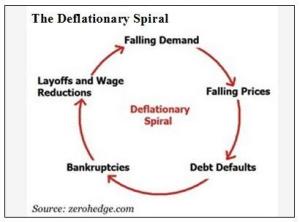If you are unsure you should dip your trembling toe into investment waters, reread FINANCE FOR THE CLUELESS: INVESTING – THE DON’TS right here at Dollar$.
CAUTION TO THE HARDHEADED
If you are persuaded that the game is rigged and that age hates youth, deliberately having made money management and life-planning a cruel losing joke, consider that the bad guys will someday kick the bucket. When they do, will you be among ageing schmucks still claiming injustice or do you want to position yourself to take your place as a leader?
The choice is yours.
If you are a twenty-something ready to grow up, or a thirty-something ready to take your share of the American Dream, you have come to the right place.
Dollar$ will not equivocate. Here is what you must do to GET RICH SLOWLY.
Should you discover you need to get rich quickly, Dollar$ urges you to bet on race horses. At any racetrack, you will breathe fresh air, find friendly company, free parking, and can probably purchase a half-decent meal. You will quickly go broke, of course, but during the 1:12 it takes for a decent thoroughbred to run 6 furlongs you can scream yourself silly and dream of riches. Quarter horse racing is even faster!
OPEN AN ACCOUNT
Choose a brokerage like Schwab or Ameritrade, any organization that fits your digital lifestyle. Investigate apps or web sites; choose the brokerage that seems most navigable to you for research, purchasing, and tracking your holdings. You will want more as you learn more, but you need to be comfortable with an interface.
The Internet has leveled the cost of doing business, about $7.95 for any online stock trade, so in terms of costs brokerage firms are interchangeable. At issue for you is service and minimums.
Most brokerages require a minimum amount to open an account: as this is written, Schwab is asking for a measly $500—perfect for the Clueless.
FEATURES
- Options. If you can get approved for Options trading, get it. You will not use this until you have considerable wealth, but it costs nothing to check a box.
- Margin. Again, check it off and leave it the hell alone until you know what the hell you are doing, and even then think very, very, carefully about borrowing money from your broker to make an asset purchase—which is what Margin trading is about. Remember, your broker is not your partner. Your gains are your gains alone (W00t W00t!), but your losses are your losses alone. If you owe a margin debt, you will owe what you owe no matter what happens.

Margin accounts may have uses, but can be dangerous.
You know Tony down at the docks? The guy who lends money to people with no collateral? He is happiest when you pay him, but he does not care if your team lost, the deal went south, or your honey made off with your boodle—he only wants his money and interest back. When he does not get it, he becomes surly. He makes you sell your car, cash in in your kid’s college fund, and if necessary persuade you to these measures by realigning your knee caps with a baseball bat he keeps handy for just that purpose.
Think of your Margin account as Tony. Don’t let anyone get medieval on you.
3. Check Writing. Take it. Add a measure of liquidity to your assets. You can write an emergency check if you need to—which you should not, but shit happens.
4. Reinvest Dividends. Absolutely. Dividends are how companies share profits with shareholders. Dividends are not interest, but in effect, reinvesting dividends is how your account will draw compound interest.

“He who understands compound interest , earns it … he who doesn’t … pays it.”
Einstein
THE EIGHT DO’S AND WHY
1. Buy stock in at least 3 companies traded on either the New York Stock exchange or the OTC (Over the Counter) markets. Be sure these companies are in very different economic sectors. In other words, do not buy 3 media companies, or 3 retail companies, or 3 technology companies, but perhaps buy 1 of each.
You require a measure of diversity. You can buy diversity in a mutual fund, of course, a basket of stocks managed by professionals, but then you pay fees for professional management. Dollar$ cautions the clueless, who by definition are starting small, that the fees will bleed you white. Why start your financial life with a tapeworm?
Diversity is insurance against misfortune. While one sector of the economy may take a hit from unexpected circumstances—such as a change in a government regulatory posture or a political event in a faraway country— the only circumstance that will affect all 3 of your sectors are changes in the overall economic picture, such as a change in interest rates. For the investor who wants to GET RICH SLOWLY, those dips can be shrugged off because unlike you and me, companies that sell goods and services can within limits raise their prices to recoup what was lost. The price of lumber goes up, the furniture business takes a hit, but next year the price of furniture rises. It’s not as though people will start sitting on the floor.
What constitutes a sector is very subjective. Is Walt Disney a service company or a media company? Different online research will yield different sector guides. Here is one website that will allow you to bore down to Market Cap leaders by sector.
The final arbiter of what is what is you, Binky, so give special considerations to companies that are conglomerates. General Electric, the oldest company in the Dow Jones Industrial Average, founded by Thomas Edison, makes washing machines, jet engines, and runs an insurance business. What sector is that?
2. Buy stock in companies that are at least 20 years old.
Ten-year-old companies have a modest track record of survival; twenty-year-olds are even better.
Yes, Dollar$ is aware that young companies are set to grow quickly, but they frequently are headed by untried management and are closer to going broke. Most corporations live little more than a person’s lifetime though the exceptions are remarkablebecause they embrace a culture of change and innovation. 3M Corporation was founded in 1902 to make sandpaper; now they make Post-It notes and Scotch Tape.
Young companies will also gather imitators, which mean ever-increasing competition will drive revenues, but not costs, downward. Someone is bound to improve on the original idea. If the good Lord in 1985 had whispered in your ear, “Computers,” you may have chuckled at the Divine Wisdom that loaded your portfolio with Kaypro, Atari, Commodore, and Wang. Like last winter’s snow, those companies are now gone.
Avoid the bleeding edge.
3. Buy stock in at least two companies that are multinationals.
 Doing business in places where general economic growth is not dependent on the value of US currency is simply prudent. Dollar$ would never bet against the financial muscle of the United States, but Dollar$ is aware that infrastructure build-out in the 3rd world is inevitably followed by consumer demand for a higher standard of living. You do not have to buy stock in a Chinese company to participate in the Chinese economy; you do not need to need to buy stock in a Chilean company to participate in the Chilean economy. Logos and trademarks Americans see every day are all over the world: UPS, Disney, Starbucks, Pizza Hut… the list is endless.
Doing business in places where general economic growth is not dependent on the value of US currency is simply prudent. Dollar$ would never bet against the financial muscle of the United States, but Dollar$ is aware that infrastructure build-out in the 3rd world is inevitably followed by consumer demand for a higher standard of living. You do not have to buy stock in a Chinese company to participate in the Chinese economy; you do not need to need to buy stock in a Chilean company to participate in the Chilean economy. Logos and trademarks Americans see every day are all over the world: UPS, Disney, Starbucks, Pizza Hut… the list is endless.
If you have qualms about such things and think they are imperialistic, ask the folks in Red Square how they like burgers at McDonald’s, or ask Chinese citizens if the prefer iPhones to ‘Droids.
4. Buy stock in companies that pay dividends or, even better, have a history of raising regularly dividends.
Many companies do not share their profits with shareholders via dividends because managers hoard cash for future business investment. While Dollar$ respects the managerial strategy, Dollar$ notes such companies do not suit a strategy to get rich slowly. The Clueless want an opportunity to have their dividends accrue ever more stock.
Better yet, companies that pay dividends suffer less in a downturn because their dividends offer investors a yield, a cushion against losses.
5. Buy and Hold—even if it means going white-knuckled.
On September 16, 2008 the general stock market as measured by the Dow Jones Industrial Average crashed 10 percent in a single day. The Buccaneers who ran major financial institutions were competing to take greater risks for greater profits than any responsible bank should, fudging on what “banking” meant. On Sept 12, 2008 the DJIA was at 11,421.99. By November 21, it was down to 8046.42 a breathtaking loss of 29 percent in 6 weeks.
Iceland went broke, Lehman Brothers went out of business, and for the first time ever, US citizens heard the phrase, “Too big to fail.”
Anyone who sold to defend his or her assets for fear of total ruin took themselves out of the game. They may have felt safer, but by doing so, they gave up any chance of recovery.
As Dollar$ writes, the DJIA stands above 16,000—which means sellers in 2008 have missed 100 percent gains measured from then, only six years. By selling into a panic, they gave up every opportunity to gain back all they lost and more.
True, if you owned stock in Lehman Brothers you took it in the neck, but if you had a diversified portfolio, over all, you survived and may have even made money.
A wise man once said, “You can’t go broke on a small profit.”
6. Buy shares and add to your portfolio regularly.
Ideally, you may be able to invest with a check-off system from your salary, an arrangement that will allow even those of us lacking personal discipline to take advantage of the maxim: Pay Yourself First.
Regular investing will allow you to take advantage of “dollar-cost averaging.” When stocks are up, you’ll buy fewer shares: when stocks are down, you’ll buy more shares. On average your cost will be somewhere in between. Free yourself from trying to guess if today or tomorrow are better days to buy; let time be your friend.
If your companies thrive and move steadily upwards, your average cost will always be below their current price level. Over the long haul, stocks historically have gained 7-9 percent annually. Never try to time the market—just be a steady buyer and Get Rich Slowly.
7. Buy Mid and Large Cap companies.
“Cap” refers to capitalization, the sum total of the value of all the shares issued by a company. Every company issues a different number of shares, so a company floating a million shares priced at $100 per share is worth $100 million dollars, but a company with 5 million shares priced at $50 per share is worth $250 million. That’s right, the company trading at the lower price is worth more.
Large Cap companies are slow as battleships, but not likely to sink quickly; Mid Cap companies are more nimble and want nothing more than to grow to be Large Cap. They will take more risk, but have a record for taking risks and winning because they really were once Small Caps.
There are plenty of Small Cap companies, and investing in them is a respectable strategy, but Dollar$ does not recommend that to the Clueless: one needs a larger portfolio to overcome the inevitable losses small companies encounter. While a few Small Caps will experience spectacular growth, more will fail or stay stagnant. On average, an investor might do well, but only if the investor has a sufficiently diverse portfolio, unavailable to the Clueless without professional management—which must be paid for.
8. Sell when the reasons you bought a company change or the fundamentals of the business change.
You selected XYZ company for your portfolio for reasons. Maybe you personally liked the product or the service; maybe liked the company’s competitive position; maybe you liked the company’s record for paying dividends; maybe you read and were persuaded by the company’s strategic plans; ideally, you liked some combination of all of those.
But if those any of those change, why are you still holding the company? Never fall in love with a stock; review your portfolio regularly, at least every 3 years. Save your loyalty for a lover.
NOW WHAT
Discovering companies that fit the Dollar$ profile from the universe of thousands of companies is, in fact, easy. You chose your broker because it offered digital tools for Research. Try the “screening” or “filtering” system—pick an economic sector, indicate your requirements in terms of dividends, choose from Large Cap or Mid Cap, etc.
- Read about the company’s businesses. If you do not understand what they do, go no further. Invest only in what you understand.
- Invest only in companies that sell services or products you would buy whether you were a business or a consumer.
- Buy shares in companies that are ranked first or second in their industries.
- Be disciplined. Avoid trendy and hot stock tips, whether from your Uncle Fred or a TV pundit who is obliged to scream “news” at an audience every evening. Near term, they may be right: let someone else make that money while you sleep soundly.
- Invest and relax—let your money work while you sleep and pay no attention to daily, monthly, or even annual trends. You are going for the long haul, and the long haul is steadily upward and has been for hundreds of years.
 But suppose IW’s best leadership expects the market for widgets is spiraling downward. Perhaps there are insurmountable problems in the supply chain. Perhaps bankers are unwilling to part with loan money for fear of never getting paid back. Rather than pay people for playing pinochle while their widget machines stand idle, 10 percent of the IW workforce is fired. The Manhattan condo market freezes, and the IW private jet makes fewer flights to the Caribbean. The price of widgets will plunge because the people who use widgets know that to meet the slowdown, IW will cut prices and hope to make up in volume what they are losing in price. The spiral down is called deflation; falling prices are not terrifying if they are gradual and do not continue for any great length of time.
But suppose IW’s best leadership expects the market for widgets is spiraling downward. Perhaps there are insurmountable problems in the supply chain. Perhaps bankers are unwilling to part with loan money for fear of never getting paid back. Rather than pay people for playing pinochle while their widget machines stand idle, 10 percent of the IW workforce is fired. The Manhattan condo market freezes, and the IW private jet makes fewer flights to the Caribbean. The price of widgets will plunge because the people who use widgets know that to meet the slowdown, IW will cut prices and hope to make up in volume what they are losing in price. The spiral down is called deflation; falling prices are not terrifying if they are gradual and do not continue for any great length of time.






